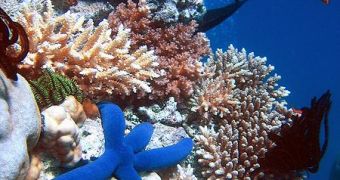Researchers from the Smithsonian reached the conclusion that the coral reefs' biodiversity has been significantly underestimated.
This statement was made after experts evaluated the potential of a tropical surface measuring 20.6 square feet (6.3 square meters). They discovered that it shelters as many crab species as one might find in all the seas of Europe, put together.
According to their breakthrough, published in PloS ONE, the experts have analyzed and tabulated 168 crab species out of a total amount of 525 crustaceans, coming from seven sites.
While talking about the ecosystems' diversity, experts say that such regions could represent the habitat of up to nine million species, but biologists still have a hard time establishing the exact number.
"We cannot give a new estimate today, but we may be able to in a few years," declared Plaisance.
Also, according to the numbers provided by the study, the Indo-Pacific west surface ranks first in the list of the coral reef areas with the highest number of different species.
In order to emphasize the ecosystem's impressive biodiversity, researchers say that 81% of the species which were discovered in this location have been found only in one place.
DNA barcoding was the fastest and most cost-efficient method that allowed the scientists to register the newly-found creatures. Experts in this field of activity chose this path because it has helped them discover what really lives in the ocean at this point in time. It also gave them the possibility to store the data for future reference.
“The finding of such large numbers of species in a small total area suggests that coral reef diversity is seriously under-detected using traditional survey methods, and by implication, underestimated,” stated the authors in their paper.
The coral reef's beauty and amazing diversity is threatened by climate change and human influence. Overfishing and pollution are two of the most serious issues which put this habitat in danger.
Despite the fact that it should be preserved, taking into account that it represents one of the richest marine environments, such areas suffer a great deal due to the increased levels of greenhouse emissions.
Unless governments scale up their efforts to protect the endangered coral reefs, these rich, overpopulated ecosystems might disappear from the map within a hundred years, according to Charlie Veron, former Chief Scientist of the Australian Institute of Marine Science.

 14 DAY TRIAL //
14 DAY TRIAL //